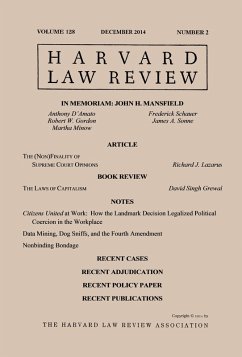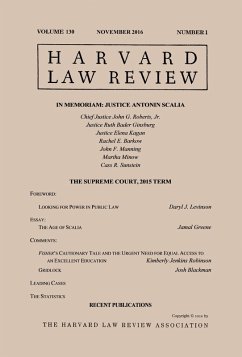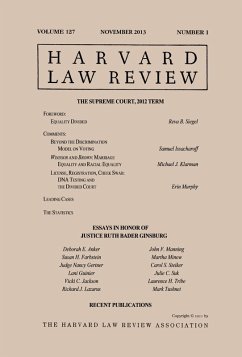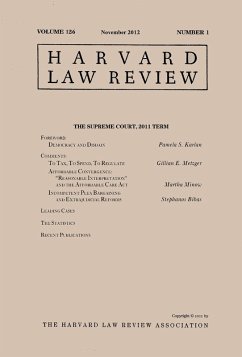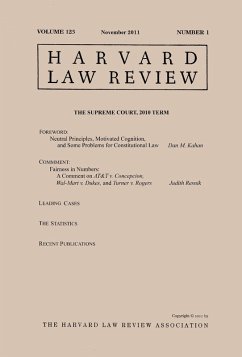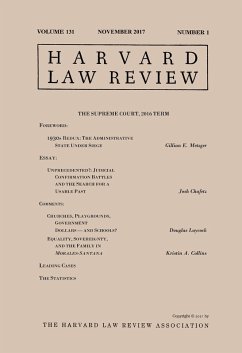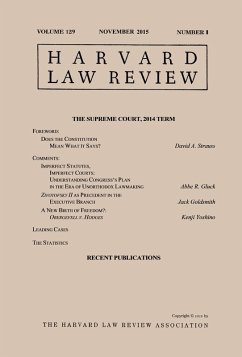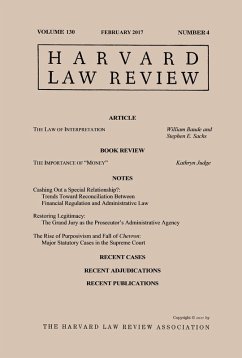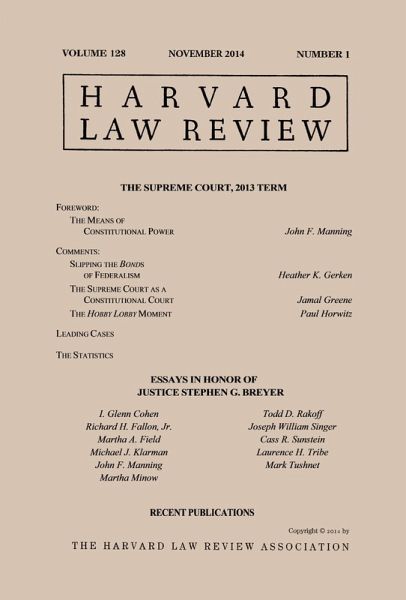
Harvard Law Review: Volume 128, Number 1 - November 2014 (eBook, ePUB)

PAYBACK Punkte
0 °P sammeln!
The November issue is the special annual review of the U.S. Supreme Court's previous Term. Each year, the issue is introduced by noteworthy and extensive contributions from recognized scholars. In this issue, for the 2013 Term, articles include: Foreword: "The Means of Constitutional Power," by John F. Manning Comment: "Slipping the Bonds of Federalism," by Heather K. Gerken Comment: "The Supreme Court as a Constitutional Court," by Jamal Greene Comment: "The Hobby Lobby Moment," by Paul Horwitz In addition, the first issue of each new volume provides an extensive summary of the important case...
The November issue is the special annual review of the U.S. Supreme Court's previous Term. Each year, the issue is introduced by noteworthy and extensive contributions from recognized scholars. In this issue, for the 2013 Term, articles include: Foreword: "The Means of Constitutional Power," by John F. Manning Comment: "Slipping the Bonds of Federalism," by Heather K. Gerken Comment: "The Supreme Court as a Constitutional Court," by Jamal Greene Comment: "The Hobby Lobby Moment," by Paul Horwitz In addition, the first issue of each new volume provides an extensive summary of the important cases of the previous Supreme Court docket, covering a wide range of legal, political and constitutional subjects. Student commentary on Leading Cases of the 2013 Term includes recent cases on: content neutrality under the First Amendment; compelled subsidized speech; free speech and contribution limits; legislative prayer and the establishment of religion; search and seizure law as to anonymous tips, cellphones, and co-tenant consent; equal protection and political process; right to counsel; Eighth Amendment issues for intellectually impaired defendants; standing and jurisdiction; class actions; tribal immunity; the Clean Air Act; immigration of children; misrepresentation of buyer and gun control law; and copyright law. Complete statistical graphs and tables of the Court's actions and results during the Term are included. Finally, the issue features several summaries of Recent Publications. The issue also features essays on substantive and procedural law, and judicial method, honoring Justice Stephen G. Breyer and his notable contributions to law and the Supreme Court. The essays are written by scholars Martha Minow, Martha Field, Cass Sunstein, Richard Fallon, Michael Klarman, Todd Rakoff, Joseph Singer, John Manning, Laurence Tribe, I. Glenn Cohen, and Mark Tushnet. The Harvard Law Review is offered in a quality digital edition, featuring active Contents, linked footnotes, active URLs, legible tables, and proper ebook and Bluebook formatting. This current issue of the Review is November 2014, the first issue of academic year 2014-2015 (Volume 128).
Dieser Download kann aus rechtlichen Gründen nur mit Rechnungsadresse in A, B, CY, CZ, D, DK, EW, E, FIN, F, GR, H, IRL, I, LT, L, LR, M, NL, PL, P, R, S, SLO, SK ausgeliefert werden.




